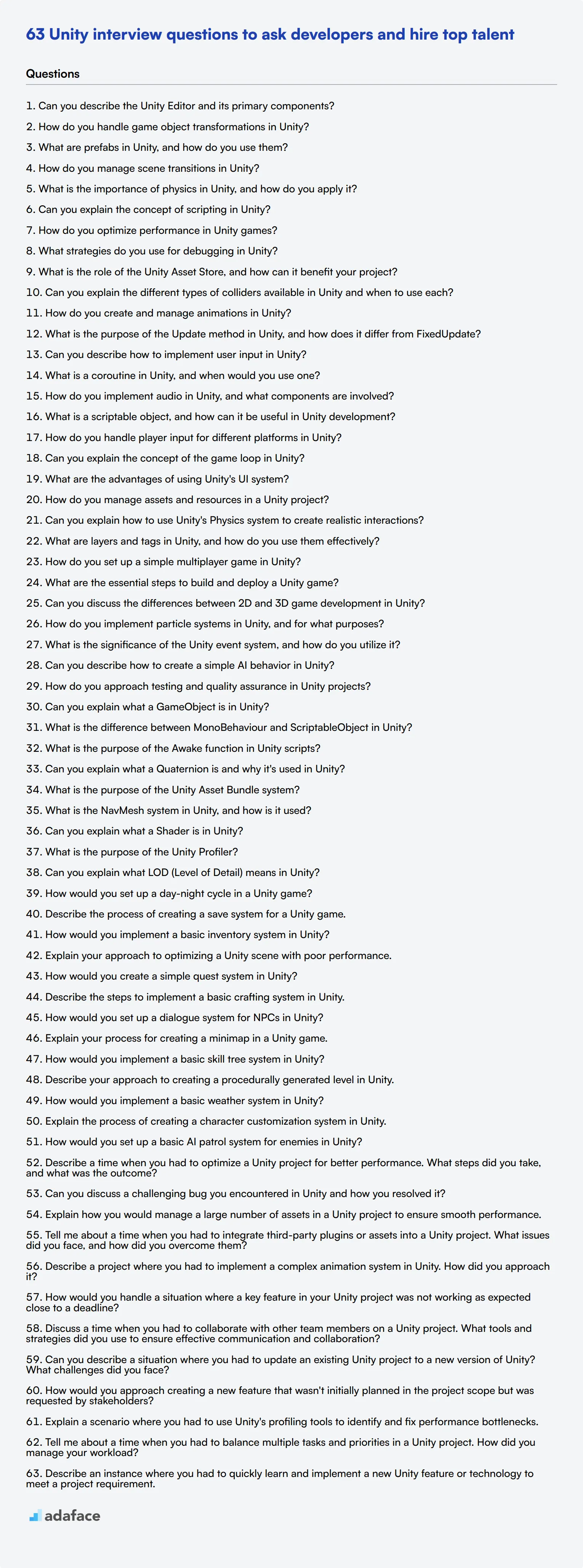When interviewing for a Unity developer role, it's important to ask the right questions to gauge a candidate's expertise. Having a structured set of questions can help you identify the best talent for your team, preventing the consequences of a bad hire, such as wasted resources and reduced team morale.
This blog post provides a comprehensive list of Unity interview questions, categorized to cover general queries, technical definitions, process-related inquiries, and situational questions. Each section is designed to help you assess different aspects of a candidate's skills and experience effectively.
By using these questions, you can streamline your interview process and make more informed hiring decisions. Supplement your interviews with the Unity skills test from our library to evaluate candidates accurately before they even step into the interview room.
Table of contents
8 general Unity interview questions and answers
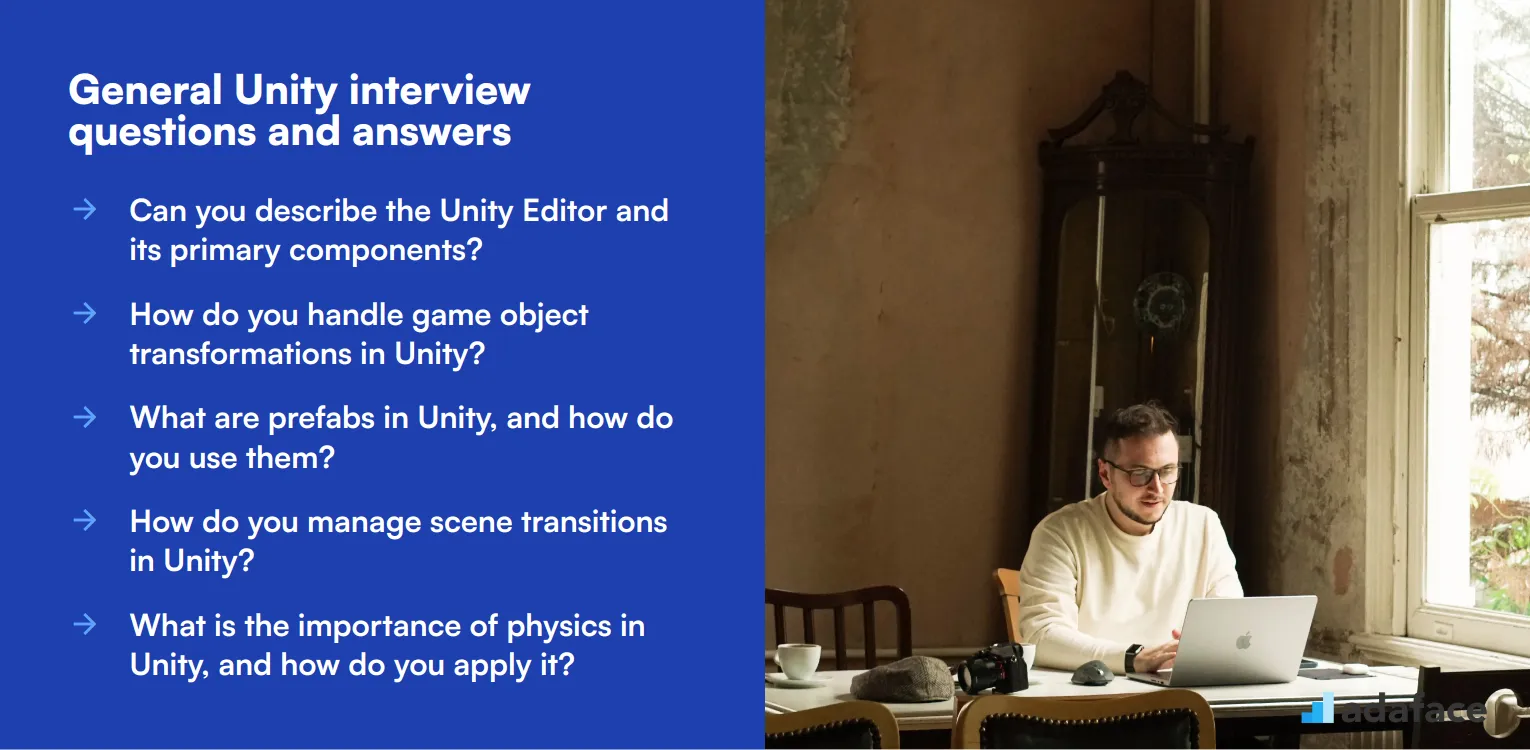
To identify the right Unity developer for your team, consider using these general Unity interview questions. They're designed to help you evaluate candidates' understanding of core concepts and their ability to apply this knowledge in practical scenarios.
1. Can you describe the Unity Editor and its primary components?
The Unity Editor is the main workspace for developers, where all game development happens. Its primary components include the Scene view, Game view, Hierarchy window, Project window, Inspector window, and Console window.
Ideal candidates should be able to explain these components in detail, showing their familiarity with the development environment. Look for explanations of how each component contributes to the game development process.
2. How do you handle game object transformations in Unity?
In Unity, game object transformations are handled using the Transform component, which includes position, rotation, and scale. These can be manipulated through scripting or directly in the Unity Editor.
A strong candidate should mention using the Transform component to move, rotate, or scale objects and possibly discuss using functions like Translate, Rotate, or setting properties directly. Look for practical examples and an understanding of how transformations affect gameplay.
3. What are prefabs in Unity, and how do you use them?
Prefabs in Unity are reusable game object templates that can be instantiated multiple times in a scene. They help in maintaining consistency and efficiency, allowing developers to make updates in one place and apply them across all instances.
Candidates should explain the benefits of prefabs, such as ease of updates and reusability. Look for examples of how they've used prefabs in past projects to streamline their development process.
4. How do you manage scene transitions in Unity?
Scene transitions in Unity are managed using the SceneManager class. You can load new scenes using methods like LoadScene or LoadSceneAsync and unload scenes with UnloadSceneAsync.
A proficient candidate should demonstrate familiarity with these methods and discuss practical scenarios where they've implemented scene transitions. Look for an understanding of the pros and cons of different loading techniques, especially regarding performance.
5. What is the importance of physics in Unity, and how do you apply it?
Physics in Unity is crucial for creating realistic interactions and movements. Unity's physics engine allows developers to simulate real-world physics, including gravity, collisions, and rigid body dynamics.
Expect candidates to discuss components like Rigidbody, Colliders, and Physics Materials. They should provide examples of applying physics in their projects, ensuring realistic behavior and interactions in their games.
6. Can you explain the concept of scripting in Unity?
Scripting in Unity involves writing code in C# to control the behavior of game objects and implement game logic. Scripts are attached to game objects and can interact with Unity's API to manipulate game elements.
Candidates should highlight their experience with C# scripting, mentioning common tasks like event handling, input management, and custom component creation. Look for a solid understanding of Unity's scripting lifecycle and practical problem-solving skills.
7. How do you optimize performance in Unity games?
Optimizing performance in Unity involves techniques like reducing draw calls, optimizing mesh and texture usage, using object pooling, and minimizing the use of expensive operations in scripts.
Strong candidates should provide specific examples of optimization techniques they've used, such as implementing occlusion culling or optimizing physics calculations. Look for an understanding of balancing performance with visual and gameplay quality.
8. What strategies do you use for debugging in Unity?
Debugging in Unity can be done using the Console window to view error messages, using Debug.Log statements to output variable values, and employing breakpoints and the debugger in Visual Studio.
Candidates should discuss various debugging strategies, including using profiler tools to identify performance bottlenecks and analyzing stack traces to pinpoint issues. Look for a methodical approach to identifying and solving problems.
21 Unity interview questions to ask junior developers
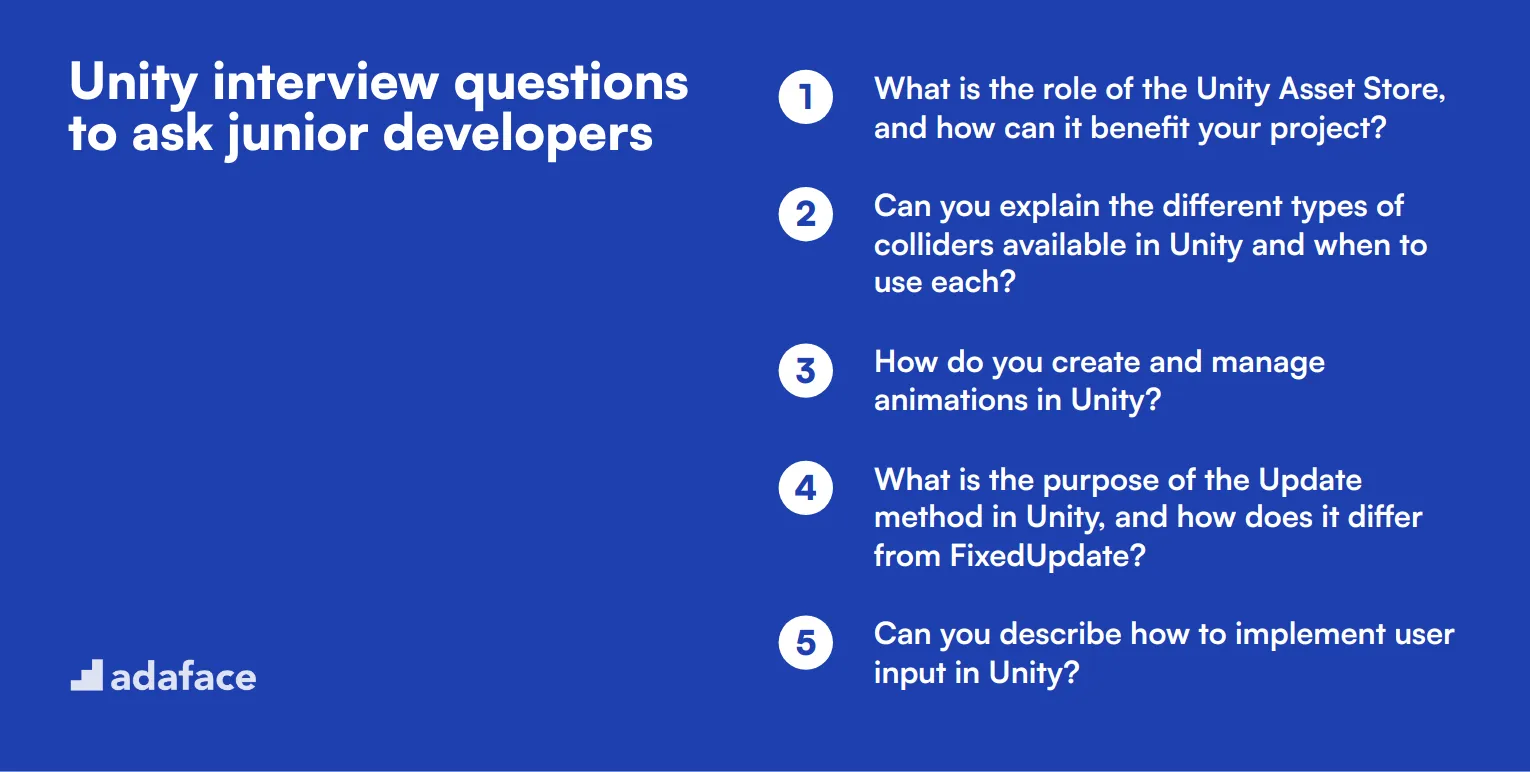
To evaluate the skills of junior developers in Unity, consider using this curated list of interview questions. These questions will help you gauge their understanding of essential concepts and practical applications relevant to Unity development. For a deeper dive, check out our game developer job description for more insights.
- What is the role of the Unity Asset Store, and how can it benefit your project?
- Can you explain the different types of colliders available in Unity and when to use each?
- How do you create and manage animations in Unity?
- What is the purpose of the Update method in Unity, and how does it differ from FixedUpdate?
- Can you describe how to implement user input in Unity?
- What is a coroutine in Unity, and when would you use one?
- How do you implement audio in Unity, and what components are involved?
- What is a scriptable object, and how can it be useful in Unity development?
- How do you handle player input for different platforms in Unity?
- Can you explain the concept of the game loop in Unity?
- What are the advantages of using Unity's UI system?
- How do you manage assets and resources in a Unity project?
- Can you explain how to use Unity's Physics system to create realistic interactions?
- What are layers and tags in Unity, and how do you use them effectively?
- How do you set up a simple multiplayer game in Unity?
- What are the essential steps to build and deploy a Unity game?
- Can you discuss the differences between 2D and 3D game development in Unity?
- How do you implement particle systems in Unity, and for what purposes?
- What is the significance of the Unity event system, and how do you utilize it?
- Can you describe how to create a simple AI behavior in Unity?
- How do you approach testing and quality assurance in Unity projects?
9 Unity interview questions and answers related to technical definitions
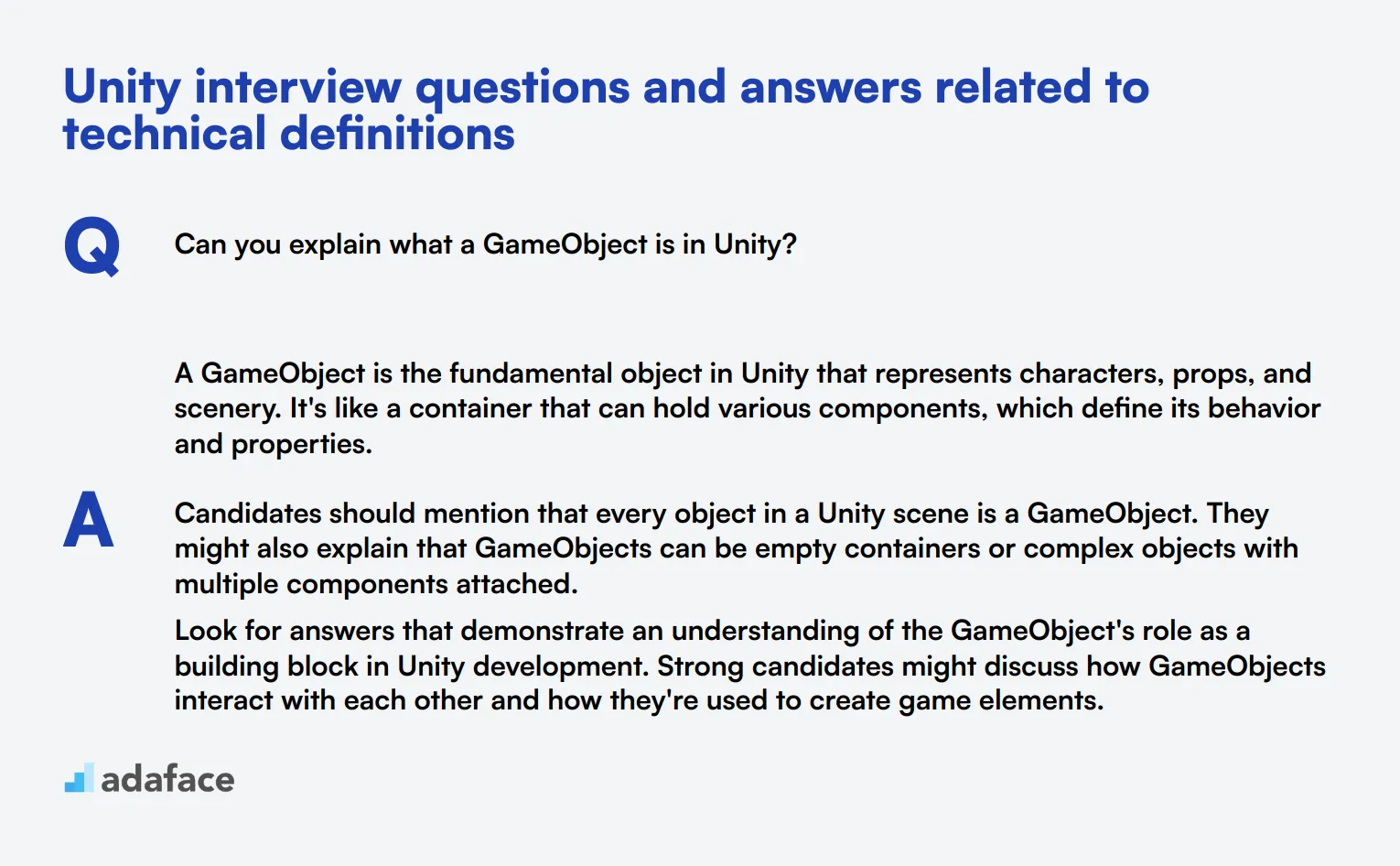
When interviewing Unity developers, it's crucial to assess their technical knowledge and understanding of key concepts. These 9 questions about technical definitions will help you gauge a candidate's grasp of Unity fundamentals. Use them to spark discussions and dig deeper into their expertise.
1. Can you explain what a GameObject is in Unity?
A GameObject is the fundamental object in Unity that represents characters, props, and scenery. It's like a container that can hold various components, which define its behavior and properties.
Candidates should mention that every object in a Unity scene is a GameObject. They might also explain that GameObjects can be empty containers or complex objects with multiple components attached.
Look for answers that demonstrate an understanding of the GameObject's role as a building block in Unity development. Strong candidates might discuss how GameObjects interact with each other and how they're used to create game elements.
2. What is the difference between MonoBehaviour and ScriptableObject in Unity?
MonoBehaviour is a base class for components that attach to GameObjects, allowing them to receive Unity lifecycle events and interact with the game world. ScriptableObject, on the other hand, is a data container class used to store and share data across different objects and scenes.
Candidates should explain that MonoBehaviours are instance-specific and tied to GameObjects, while ScriptableObjects are asset-based and can exist independently of scene objects.
Look for responses that highlight the practical uses of each. A strong answer might discuss using MonoBehaviours for game logic and ScriptableObjects for configuration data or shared resources.
3. What is the purpose of the Awake function in Unity scripts?
The Awake function is a special method in Unity that's called when a script instance is being loaded. It's used for initialization of variables or game state before the game starts.
Candidates should mention that Awake is called only once during the lifetime of the script instance and is called even if the script component is disabled.
Look for answers that contrast Awake with Start. Strong candidates might explain that Awake is used for initializations that need to happen before any other scripts' Start methods are called, ensuring proper setup of object references and initial state.
4. Can you explain what a Quaternion is and why it's used in Unity?
A Quaternion is a mathematical concept used in Unity to represent rotations. It's a four-dimensional vector that avoids the problem of 'gimbal lock' associated with Euler angles.
Candidates should mention that while Quaternions are less intuitive to work with directly, they provide a more stable and efficient way to handle rotations in 3D space.
Look for answers that demonstrate an understanding of why Quaternions are preferred over Euler angles for rotations. Strong candidates might discuss how to convert between Quaternions and Euler angles or mention Unity's built-in functions for working with Quaternions.
5. What is the purpose of the Unity Asset Bundle system?
Asset Bundles are a way to package and distribute assets in Unity. They allow developers to stream content to their game or application, reducing initial download size and enabling dynamic content updates.
Candidates should explain that Asset Bundles can contain any type of Unity asset, including models, textures, prefabs, and even entire scenes. They might also mention that Asset Bundles can be loaded at runtime, allowing for more efficient resource management.
Look for answers that discuss the practical applications of Asset Bundles, such as downloadable content (DLC), reducing initial app size, or platform-specific asset management. Strong candidates might mention challenges in using Asset Bundles, like version management or caching strategies.
6. What is the NavMesh system in Unity, and how is it used?
The NavMesh (Navigation Mesh) system in Unity is a built-in pathfinding solution for game developers. It generates a simplified representation of the game world that AI-controlled characters can use to navigate.
Candidates should explain that NavMesh works by baking the walkable surfaces of a game level into a mesh, which agents can then use to calculate paths. They might mention components like NavMeshAgent and NavMeshObstacle.
Look for answers that demonstrate an understanding of when and why to use NavMesh. Strong candidates might discuss the process of baking a NavMesh, adjusting agent properties, or handling dynamic obstacles in the navigation system.
7. Can you explain what a Shader is in Unity?
A Shader in Unity is a specialized program that determines how to render graphics on the GPU. It defines how the properties of materials, such as color, texture, and lighting, are calculated and applied to objects in the game.
Candidates should mention that Unity uses a shader language called ShaderLab, which is a wrapper around HLSL (High-Level Shader Language). They might also discuss the different types of shaders, such as vertex shaders and fragment shaders.
Look for answers that demonstrate an understanding of the role shaders play in the rendering pipeline. Strong candidates might discuss the performance implications of complex shaders or mention Unity's built-in shader options versus custom shaders.
8. What is the purpose of the Unity Profiler?
The Unity Profiler is a powerful tool used to analyze and optimize the performance of Unity applications. It provides detailed information about how much time is spent in various parts of the game, helping developers identify bottlenecks and inefficiencies.
Candidates should explain that the Profiler can track CPU usage, memory allocation, rendering statistics, and other performance metrics. They might mention that it can be used both in the editor and on target devices.
Look for answers that demonstrate practical experience with the Profiler. Strong candidates might discuss specific optimization techniques they've applied based on Profiler data, or mention how to use the Profiler to diagnose performance issues across different platforms.
9. Can you explain what LOD (Level of Detail) means in Unity?
LOD (Level of Detail) in Unity is a technique used to optimize rendering performance by reducing the complexity of 3D models as they move further from the camera. This helps maintain a balance between visual quality and performance.
Candidates should mention that Unity's LOD system allows developers to create multiple versions of a model with varying levels of detail. They might explain how the LOD Group component is used to manage these different versions.
Look for answers that demonstrate an understanding of when and why to use LOD. Strong candidates might discuss strategies for creating effective LOD models, or mention how LOD can be combined with other optimization techniques like occlusion culling.
13 Unity questions related to processes and tasks
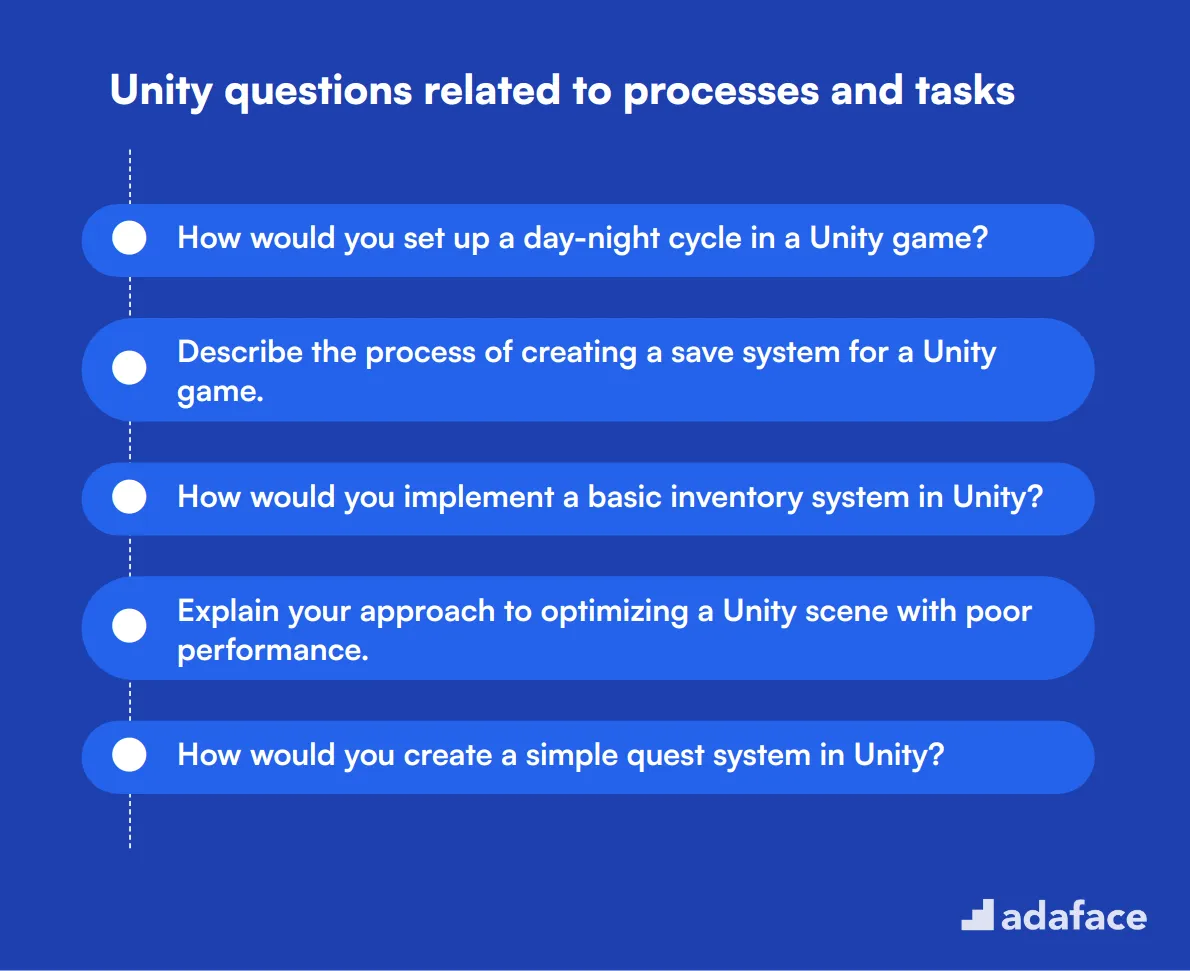
To assess a candidate's practical knowledge and problem-solving skills in Unity development, consider asking these process-oriented questions. They're designed to gauge how well applicants can handle real-world game development scenarios and tasks within the Unity environment.
- How would you set up a day-night cycle in a Unity game?
- Describe the process of creating a save system for a Unity game.
- How would you implement a basic inventory system in Unity?
- Explain your approach to optimizing a Unity scene with poor performance.
- How would you create a simple quest system in Unity?
- Describe the steps to implement a basic crafting system in Unity.
- How would you set up a dialogue system for NPCs in Unity?
- Explain your process for creating a minimap in a Unity game.
- How would you implement a basic skill tree system in Unity?
- Describe your approach to creating a procedurally generated level in Unity.
- How would you implement a basic weather system in Unity?
- Explain the process of creating a character customization system in Unity.
- How would you set up a basic AI patrol system for enemies in Unity?
12 situational Unity interview questions for hiring top developers
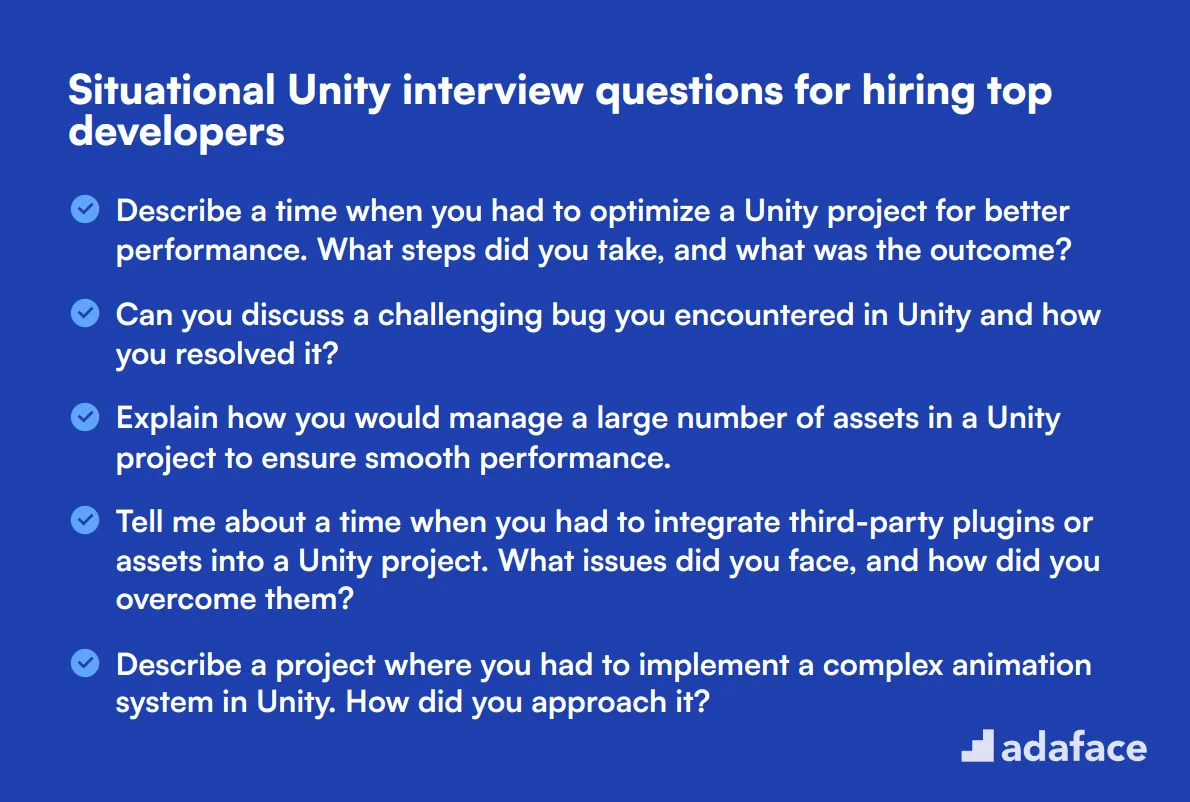
To ensure you hire top Unity developers, use these situational interview questions tailored to assess their problem-solving skills and practical experience. These questions will help you evaluate how candidates handle real-world challenges in Unity development, ensuring they have the right skills for your game development team.
- Describe a time when you had to optimize a Unity project for better performance. What steps did you take, and what was the outcome?
- Can you discuss a challenging bug you encountered in Unity and how you resolved it?
- Explain how you would manage a large number of assets in a Unity project to ensure smooth performance.
- Tell me about a time when you had to integrate third-party plugins or assets into a Unity project. What issues did you face, and how did you overcome them?
- Describe a project where you had to implement a complex animation system in Unity. How did you approach it?
- How would you handle a situation where a key feature in your Unity project was not working as expected close to a deadline?
- Discuss a time when you had to collaborate with other team members on a Unity project. What tools and strategies did you use to ensure effective communication and collaboration?
- Can you describe a situation where you had to update an existing Unity project to a new version of Unity? What challenges did you face?
- How would you approach creating a new feature that wasn't initially planned in the project scope but was requested by stakeholders?
- Explain a scenario where you had to use Unity's profiling tools to identify and fix performance bottlenecks.
- Tell me about a time when you had to balance multiple tasks and priorities in a Unity project. How did you manage your workload?
- Describe an instance where you had to quickly learn and implement a new Unity feature or technology to meet a project requirement.
Which Unity skills should you evaluate during the interview phase?
While it's challenging to fully assess a candidate's breadth of skills in a single interview, focusing on key competencies can provide crucial insights. For Unity developers, certain skills stand out as particularly telling indicators of a candidate’s capability and fit for the role.
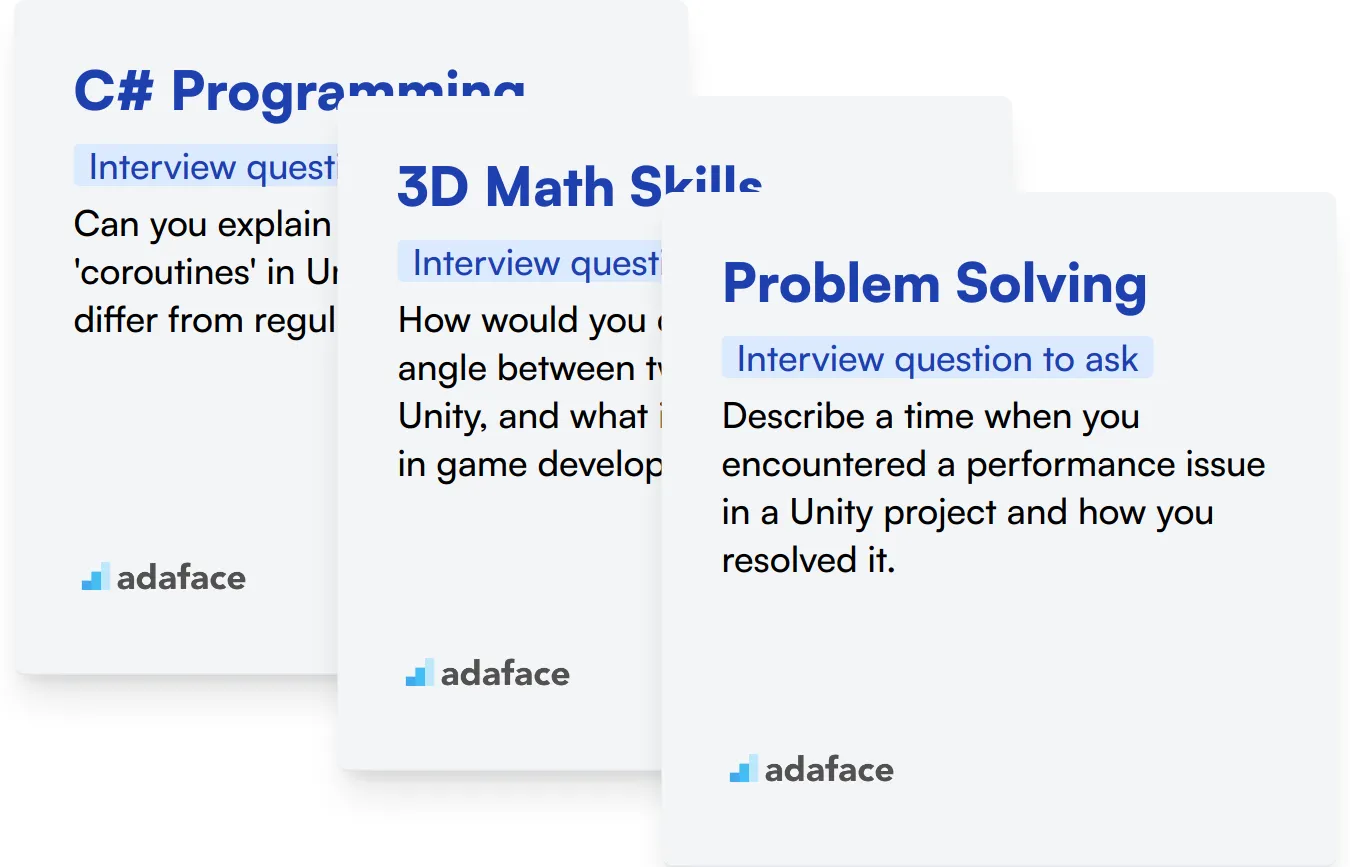
C# Programming
C# is the primary language used in Unity for scripting. A strong grasp of C# is essential for writing efficient, clean, and maintainable code in Unity projects.
Consider using a C# online assessment to gauge candidates' proficiency before the interview. This can streamline the hiring process by ensuring only qualified candidates reach the interview stage.
In the interview, delve deeper into their C# understanding with specific questions that challenge their practical application skills.
Can you explain the use of 'coroutines' in Unity and how they differ from regular methods?
Look for a clear explanation of coroutines, their use cases in game development, and an understanding of asynchronous programming within Unity.
3D Math Skills
Mathematics is critical in game development for everything from physics calculations to character movements. A solid foundation in 3D math is key for effective game design and debugging.
To assess this skill, ask questions that require the candidate to solve problems or optimize systems that involve vector mathematics and transformations.
How would you calculate the angle between two vectors in Unity, and what is its significance in game development?
The candidate should demonstrate the ability to perform vector operations and articulate their relevance to game mechanics, such as steering behaviors or camera control.
Problem Solving
Problem-solving is at the heart of game development, helping developers overcome bugs and implement features effectively. It's critical for developers to demonstrate this skill to adapt and innovate under project constraints.
One way to evaluate problem-solving abilities is by presenting candidates with a typical game development scenario that requires a creative and efficient solution.
Describe a time when you encountered a performance issue in a Unity project and how you resolved it.
Expect detailed steps on how they diagnosed and fixed the issue, showing their methodical approach to problem-solving and optimization.
Hire top talent with Unity skills tests and the right interview questions
When hiring for Unity skills, it's important to ensure candidates possess the necessary abilities. Conducting thorough assessments will help you identify the right talent who can contribute effectively to your team.
One of the most accurate ways to evaluate these skills is by utilizing specialized skills tests. Consider our Unity programming tests to assess candidates' expertise in a practical setting.
After administering the tests, you can effectively shortlist the best applicants based on their performance. This allows you to focus on top candidates for interviews, streamlining your hiring process.
To get started, visit our assessment test library and sign up today. Equip yourself with the right tools to find the best Unity experts for your team.
Download Unity interview questions template in multiple formats
Unity Interview Questions FAQs
This post covers general Unity questions, junior developer questions, technical definitions, process-related questions, and situational questions for Unity developers.
This post includes a total of 62 Unity interview questions across different categories to help you assess candidates comprehensively.
Yes, the questions range from junior developer topics to more advanced situational questions, making them suitable for various experience levels.
Use these questions to assess candidates' knowledge, problem-solving skills, and experience. Combine them with Unity skills tests for a thorough evaluation.

40 min skill tests.
No trick questions.
Accurate shortlisting.
We make it easy for you to find the best candidates in your pipeline with a 40 min skills test.
Try for freeRelated posts
Free resources




